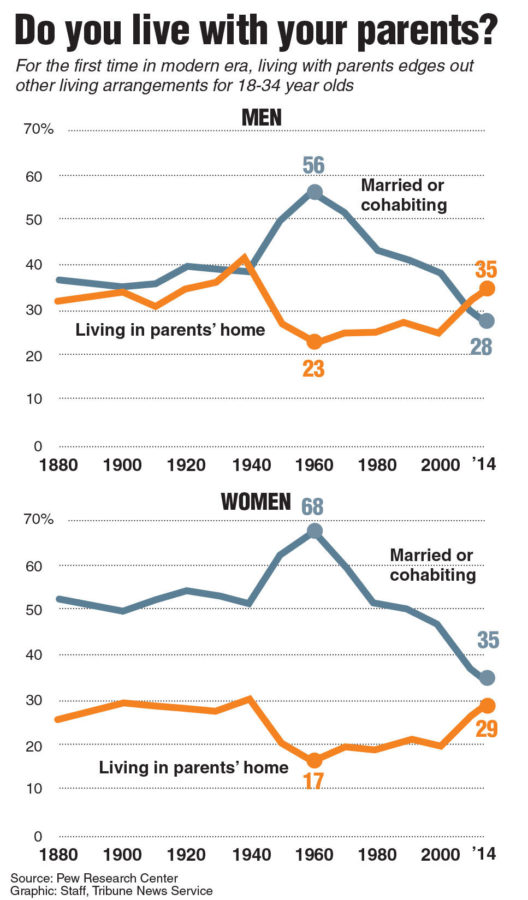Why are so many millennials living with their parents?
May 26, 2016
Interesting news this week from Pew Research Center: “In 2014, for the first time in more than 130 years, adults ages 18 to 34 were slightly more likely to be living in their parents’ home than they were to be living with a spouse or partner in their own household.”
One part of the picture: Young adults aren’t getting married as early or as often as they used to.
Are youngsters avoiding responsibility? Or do they lack opportunity? Joel Mathis and Ben Boychuk, the RedBlueAmerica columnist, consider the issue.
Advertisement
JOEL MATHIS
Pity poor millennials: They grew up expecting that young adulthood might look something like “Sex and the City.” Instead, they’re living out their own version of “The Waltons.”
There’s some good news and some bad news involved. First, the bad news: Generations are huddling under a single roof because that’s what makes economic sense.
There are more unemployed young men today than there were in the 1960s. The ones with jobs have wages that, by and large, are stagnating or even declining. The economy has been going south for the middle class for decades — though the rich have kept getting richer — and so the survivors are doing the sensible thing: They’re grouping up. It’s what Pew calls “the private safety net.”
Here’s the better news: This new grouping isn’t necessarily a bad thing. Or even new.
The last time so many 18- and 34-year-olds lived with their parents was the tail end of the Great Depression, in 1940. That group of Americans went off to fight in World War II the next year, came back and attended college — thanks to the GI Bill — then entered the workforce when the American economy had no peer. The result? A burgeoning middle class and explosive homeownership numbers. We thought it was normal. We were wrong. “Normal” may look, in fact, closer to the social arrangements we had in the 1940s.
The conservative writer Alan Jacobs recently wrote about his own experience growing up with multiple generations of family: “Through living as an extended family my parents got free child care, my grandparents got free rent, and I grew up surrounded by family members who loved me,” he wrote. “How did living this way become an image of ‘a life gone wrong?'”
Advertisement*
The “private safety net” shouldn’t be our only safety net. But as the economy changes, it might even be a source of joy and strength.
BEN BOYCHUK
Millennials are the least self-reliant and most-coddled generation yet to come of age in the United States. It’s really no wonder that a cohort raised by “helicopter parents” would effectively ground itself.
They “just can’t even,” as the saying goes.
This is the dependent generation. About 74 percent of so-called emerging adults receive financial support from their parents, regardless of whether or not they live at home, according to a 2013 Clark University poll.
A sluggish economy alone cannot explain that statistic. “Virtually all 25-year-olds could support themselves if they really had to, but then they wouldn’t be able to live a very nice life in their 20s,” Clark University research professor Jeffrey Jensen Arnett told NPR in a 2013 interview about the poll’s findings. “They could live on it, but they don’t really want to, and when it comes right down to it, their parents don’t want them to have to either.”
This is the trigger warning generation, a generation that is more brittle and far less resilient than their generation X and baby boomer forebears. According to the National Alliance on Mental Illness, more than 5 million college students in 2011 reported struggles with mental health. Depression and anxiety disorders have skyrocketed.
Depression is a real illness that millions of Americans struggle to overcome. I’m one of them. It isn’t easy, believe me. But rather than confront what ails them, many millennials demand protection from ideas, words and images that may cause them stress or anxiety. And not just on campus. They’re carrying those demands into the workplace, too.
Maintaining a close relationship with one’s parents can be a blessing. The Bible commands us honor our fathers and our mothers, and Confucius taught that children have a duty to respect, obey and care for their parents. That’s what made multigenerational households useful and important.
But that isn’t what we’re seeing today, is it? Millennials aren’t living at home out of filial piety. They’re living at home because the alternative is too awful to contemplate.
(c)2016 Tribune Content Agency, LLC
Distributed by Tribune Content Agency, LLC.
Advertisement









